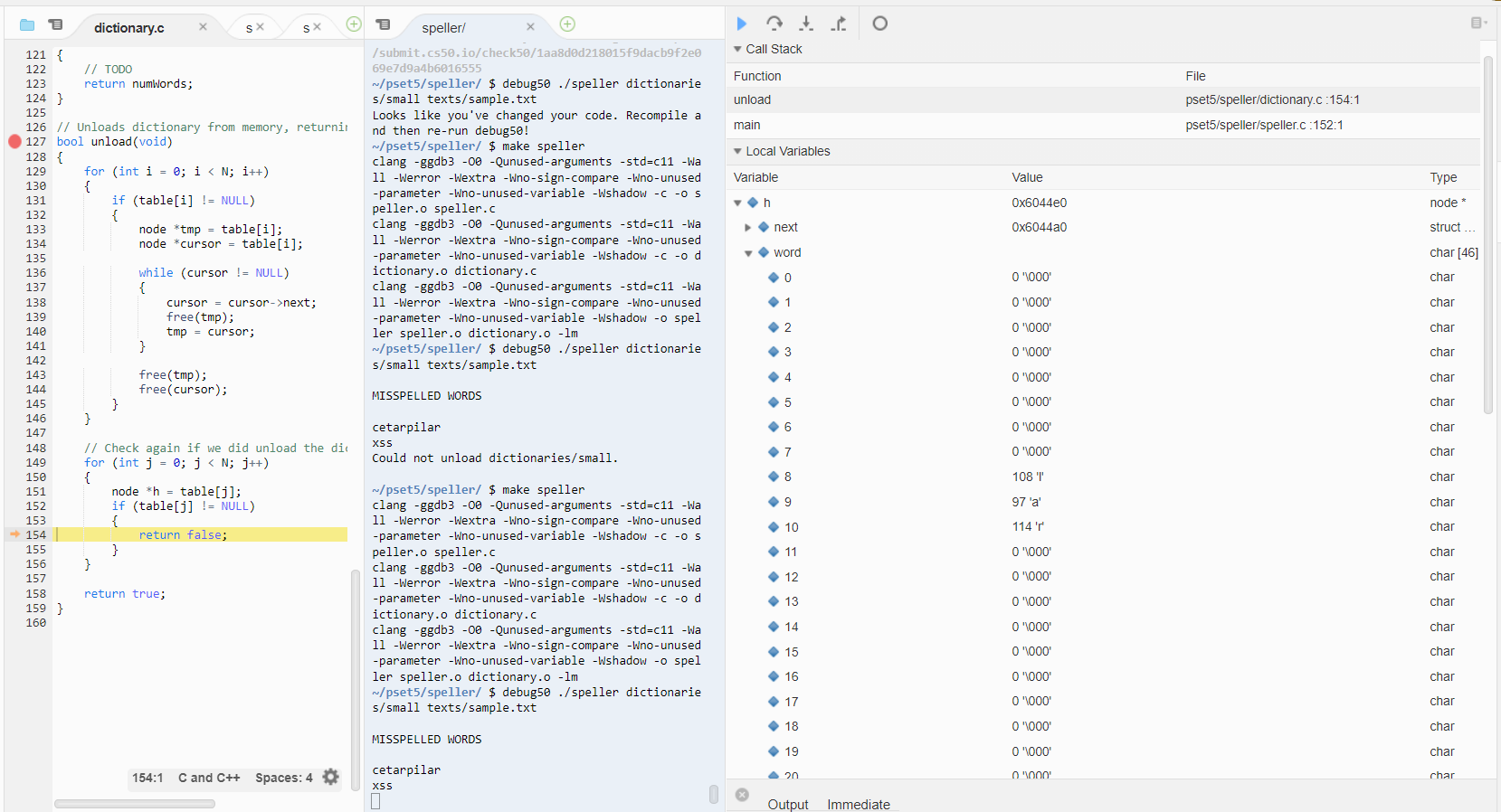UPDATE: I just fixed the capitalized spell-checking errors.
UPDATE 2: free didn't totally free the string "caterpillar". Look at image:

My code seems to encounter a weird bug where it does not count the number of words in a text file correctly. However, it can correctly count the number of words in the dictionary. In my example I made a custom sample.txt file containing the words Cat, cetarpilar, Caterpillar, and xss. When run the results show that there are 3 words in the text rather than 4. It can correctly detect cetarpilar as the misspelled word but not xss.
When I run check50, it seems evey thing is correct aside from memory leaks. What am I missing here?
Here is my code:
// Implements a dictionary's functionality
#include <stdbool.h>
#include <stdio.h>
#include <stdlib.h>
#include <string.h>
#include <strings.h>
#include "dictionary.h"
// Represents a node in a hash table
typedef struct node
{
char word[LENGTH + 1];
struct node *next;
}
node;
// Number of buckets in hash table
const unsigned int N = 26;
// Hash table
node *table[N];
// Number of words in dictionary:
unsigned int numWords = 0;
// Returns true if word is in dictionary else false
bool check(const char *word)
{
int pos = hash(word);
node *tmp = table[pos];
while (tmp != NULL)
{
if (strcasecmp(tmp->word, word) == 0)
{
return true;
}
tmp = tmp->next;
}
return false;
}
// Hashes word to a number
unsigned int hash(const char *word)
{
int first = word[0];
if (first < 123 && first > 96)
{
return first;
}
return first + 32;
}
// Loads dictionary into memory, returning true if successful else false
bool load(const char *dictionary)
{
FILE *fDict = fopen(dictionary, "r");
if (fDict == NULL)
{
return false;
}
// Longest word in the english dictionary is
// "pneumonoultramicroscopicsilicovolcanoconiosis"
// which has 45 characters. This length is stored
// as a constant in dictionary.h as "LENGTH"
// fscanf(*file, "%s\n", word of size LENGTH)
// REMEMBER: Whenever you use file operation functions,
// the file cursor will move to a new line. So when you
// use feof remember to push the cursor back one line.
char word[LENGTH+1];
int ifEOF = fscanf(fDict, "%s", word);
while (ifEOF > 0)
{
int pos = hash(word);
node *n = malloc(sizeof(node));
strcpy(n->word, word);
if (table[pos] == NULL)
{
table[pos] = n;
}
else
{
n->next = table[pos];
table[pos] = n;
}
ifEOF = fscanf(fDict, "%s", word);
numWords++;
}
fclose(fDict);
return true;
}
// Returns number of words in dictionary if loaded else 0 if not yet loaded
unsigned int size(void)
{
// TODO
return numWords;
}
// Unloads dictionary from memory, returning true if successful else false
bool unload(void)
{
for (int i = 0; i < N; i++)
{
if (table[i] != NULL)
{
node *tmp = table[i];
node *cursor = table[i];
while (cursor != NULL)
{
cursor = cursor->next;
free(tmp);
tmp = cursor;
}
free(tmp);
free(cursor);
}
}
for (int j = 0; j < N; j++)
{
if (table[j] != NULL)
{
return false;
}
}
return true;
}